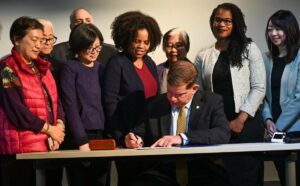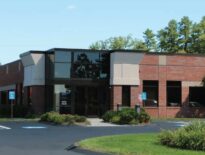
Boston Mayor Marty Walsh signs a home rule petition on Dec. 16, 2019, that would give Boston the ability to establish a local real estate transfer tax. City Councilors Lydia Edwards, second from right, and Kim Janey, fourth from left, and community representatives look on. Photo courtesy of the office of Mayor Marty Walsh.
A day after signing a home rule petition that would allow Boston to impose a 2 percent transfer tax on expensive real estate sales, Mayor Marty Walsh headed to Beacon Hill to lobby for a second petition that asks for the ability to modify the city’s development linkage fees in real time.
Boston has had a linkage fee in place since 1987, which currently charges developers of large commercial products a $9.03 per square foot contribution to affordable housing creation and a smaller fee that contributes towards job training initiatives. The city is allowed to adjust the fee every three years in line with inflation, but Walsh and the city council want the ability to make changes more frequently as the market moves. The same petition would also codify its affordable housing requirements in its zoning code.
Walsh signed the transfer tax petition in a ceremony at the Pao Arts Center in Chinatown on Monday. If approved by the legislature, it would give the city the ability to set a transfer tax up to 2 percent of the full value of any sale over $2 million, and set up various exemptions. The money would flow into the city’s Neighborhood Housing Trust Fund, which doles out grants to for-profit and nonprofit developers building affordable housing either in stand-alone projects or as part of larger, market-rate buildings.
“Housing is the biggest economic challenge facing the residents of Boston and people across our region. That’s why it’s critically important that we do everything we can to support the creation of homes that are affordable, while also preserving our existing housing stock,” Walsh said in a statement. “I am proud to sign this home rule petition that is a significant step forward in our work, by giving Boston the ability to impose a modest fee on the sale of private property, which will collectively do a world of good towards our efforts to make Boston a more affordable place to live.”
The measure, carried by Councillors Lydia Edwards and Kim Janey, is part of a slate of initiatives the city’s progressives are championing in hopes of spreading the benefits of Boston’s real estate boom more evenly.
“Housing is a public good and common responsibility, and those who generate wealth in our communities must be part of ensuring residents can remain in the neighborhoods they love,” Edwards, who chairs the council’s Committee on Housing and Community Development, said in a statement. “Today, Boston joins a growing coalition of municipalities asking the state for the power to ensure that the housing we build truly meets our residents’ needs.”
“It is absolutely imperative that we enact policies that will ensure our residents will have a safe and affordable home to live in for many generations,” Janey, vice-chair of the Committee on Housing and Community Development, said in a statement. “When passed by the state legislature, this home rule petition will help curb speculative real estate practices and stands to bring as much as $169 million in revenue annually that can be invested in affordable housing.”
Edwards’ office said the measure could generate $100 million to $168 million per year based on an analysis of all recent transactions, not just those over $2 million. Walsh has set a goal of building nearly 16,000 income-restricted housing units between 2014 and 2030.




 |
| 

